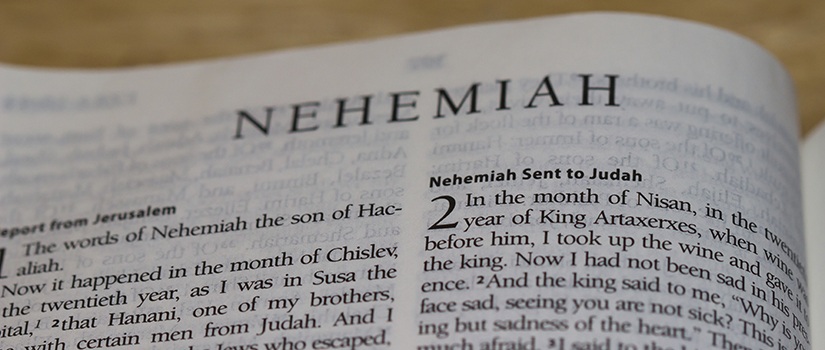“FOURTEEN YEARS AGO”
By: James L. Thornton
PAUL: A SERVANT OF JESUS CHRIST
(2 Corinthians 12:2-5)
“We are not free to say we see not, For the glory comes Nightly and daily,
Like the flowing sea; His luster pierceth through the midnight glooms;
And, at a prime hour, behold! Follows me with golden shadows to my secret rooms!”
C. T. Turner
2 Corinthians 12:2. “I knew a man in Christ above fourteen years ago, (whether in the body, I cannot tell; or whether out of the body, I cannot tell: God knoweth;) such a one caught up to the third heaven. 3. And I knew such a man, (whether in the body or out of the body, I cannot tell: God knoweth;) 4. How that he was caught up into paradise, and heard unspeakable words, which it is not lawful for a man to utter. 5. Of such a one will I glory: yet of myself I will not glory but in mine infirmities.
If we count back fourteen years from the writing of this Epistle, we shall find ourselves amid the events narrated in the thirteenth and fourteenth chapters of the Book of the Acts; especially at that momentous hour in the history of Christianity when five men, representing five different countries, met together to fast and pray for the state of the world and their duty in respect to it (Acts 13:1-3).
The Evangelist tells us in two chapters the results of that conference, in the separation and sending forth of the two missionaries; and of the hardships, difficulties, and sufferings through which they fulfilled their high calling. But Paul draws aside the veil from his heart and shows us what his inner experiences were during those wonderful months. He was a man in Christ, caught up into Paradise, the third Heaven, to hear unspeakable words.
Luke dwells on the outside, the covering of badger skins; Paul looks on the inside, the hangings of blue.
Luke speaks of the man; Paul speaks of the man in Christ.
Luke depicts the sorrows and tears that beset the men; Paul tells of the elation and joy which bore him to the very bosom of Christ so that many pains and sorrows were actually necessary as a burden, lest he should be exalted above measure on account of the abundance of revelations afforded him.
How little we know of one another’s lives. Only the little circle around us, or some twin soul, and sometimes not these, realize the visions and revelations or hear the unspeakable words, which fall to a lot of the favored soul. Perhaps even Barnabas, who shared the toils and perils of this man of God, had little or no conception of what his companion was experiencing.
He beheld the same scenes on which their outward gaze rested, but not the visions that were unfolded to the inner eye of Paul. He heard the voices that sounded in their ears, of blaspheming and reviling critics, with which so few notes of comfort and encouragement blended; he saw the stones as they flew through the air and heard the thud of their impact; but he was not aware of the still small voice of Jesus, which bade Paul have no fear.
It would be a sorry thing if all our lives could be summed up in our journeying to and fro on life’s thorough-fares, our business engagements, or our glad intercourse with the dear ones of the home circle if there were nothing except what a Barnabas might share and a Luke record.
We need to dwell deep, to have a life beneath a life, to have windows in our heart that look across the river into the unseen and eternal. The pictures that fascinate are those that suggest more than they reveal, in which the blue distance fades into the heavens, and the light mist veils mountain, moorland, and sea.
Oh for the “peace that passeth understanding,” the “joy that is unspeakable and full of glory,” the deep things which “eye hath not seen, nor ear heard, nor the heart of man conceived.” We are thankful, therefore, that we can supplement the narrative of Luke by the words of the Apostle, as he recalls what happened to him fourteen years before he wrote.
A. THE DESCRIPTION THE APOSTLE GIVES OF HIMSELF:
“A man in Christ.” He was in Christ, but that did not make him less a man. There are three qualities in a truly manly character: Resolution, Fortitude, and Courage.
Resolution means that a man will take up one high ambition and aim, prosecuting it through the good and evil report, through sun and storm.
How evidently this characterized the Apostle, who pursued his purpose of ministering to the Gentiles from Antioch to Iconium and thence to Lystra and Derbe. The hatred of the Jews did not dissuade; the fickleness of the crowds did not daunt; the hailstone storm of stones at Lystra did not turn him aside.
It was his persistent ambition to preach the Gospel where Christ had not been named so that they should see, to whom no tidings of Him had come, and they who had not heard should understand.
Fortitude means that a man should be able to sustain sorrow and heart-rending anguish. Every true man needs this, for there is no one without his hours of heart-rending grief when it seems as though the heart-strings must break and the life-blood be shed. Then to be strong, to steer straight onward, to dare to praise God, to sit alone and keep silence, because He hath laid it upon us, to put our mouths in the dust, if so be there may be hope here is fortitude indeed.
But Paul manifested fortitude also, when he bore with uncomplaining nobility the quitting of Mark, the relentless hatred of his fellow-countrymen, and after his stoning at Lystra, aroused from what had seemed to be his death swoon, struggled back into the city from which he had been dragged to all appearance a corpse, and having saluted the brethren, and especially the young Timothy, started on the following morning to continue his loved work in the neighboring cities of Derbe, Lystra, Iconium, and Antioch (Acts 14:19-21).
Courage means that a man should have a heart, like John Knox, the inscription on whose tomb tells us that one lies beneath who never feared the face of clay.
Paul never lacked courage. He never flinched from facing an amphitheater full of raging fanatics or braving consuls and procurators, or from withstanding an apostle who deserved to be blamed.
And his heroic courage was conspicuously manifested in this very journey, that instead of taking an easier and more direct route home by way of his native city and the Cilician Gates, he dared to retrace his steps to each of the cities in which he had preached, confirming the souls of the disciples, exhorting them to continue in the faith, and that through many tribulations we must enter into the kingdom of God.
At great personal risk, he stayed long enough in each place to appoint elders in the infant communities, and to pray with fasting, commending them to God, on whom they believed. (Acts 14:22-25).
When we become Christian men we do not forfeit these characteristics. No, but they become purified of ingredients that might vitiate and corrupt them. Apart from Christ resolution may become obstinacy, fortitude stoicism, and courage fatalism.
These are exaggerations and therefore defects. Directly, however, a man is in Christ not only in Christ for position but in Christ for condition; not only in Christ for standing, but in Christ in his daily walk; not only in Christ as before God, but for the environing atmosphere of his daily life then all danger of exaggeration is done away, and the native strength of manly character is invigorated from the
Lion of the Tribe of Judah, and sweetened by the meekness and gentleness of the Lamb who was slain.
B. TO SUCH, GLORY MOMENTS COME:
Days of the glories of Heaven and earth high days hours of vision and ecstasy when the tide runs high and fast and the cup of life brims to overflow. “I knew a man in Christ above fourteen years ago, (whether in the body, I cannot tell; or whether out of the body, I cannot tell: God knoweth;) such a one caught up to the third heaven . . . and heard unspeakable words, which it is not lawful for a man to utter. Of such a one will I glory.”
At first, we might suppose that the Apostle was really describing the experience of someone else. He appears to distinguish between that blessed man, whose experience he was describing, and himself. “Of such a one will I glory: yet of myself I will not glory, but in mine infirmities.”
But as his story proceeds, and he tells us that by reason of the visions and revelations granted to him there was danger of his being exalted overmuch, it becomes clear that he is describing some radiant experiences through which he passed during that first missionary tour so marked, so blessed, so full of transfiguring glory that their light had not entirely died from his heart, though
a chasm of fourteen years lay between.
Such experiences may come in hours of great pain.
The assumption that this rapture into Paradise took place during the Apostle’s stoning at Lystra. But be this as it may, he could find no words to tell what he saw and heard.
The disciple whom Jesus loved had a similar experience; he too saw through Heaven’s open door, but with all his wealth of language he has failed to do more than ransack creation and revelation for imagery and symbols which leave us in a condition of bewilderment, like the masses of color in Turner’s later pictures. Paradise was indeed a poor place if words could describe it.
The third Heaven was not worthy of its Maker if its glories did not transcend our furthest imaginings. He hath set eternity in our heart, a capacity for the infinite, a yearning after the Divine.
In hours of reverie, when stirred by certain notes in music, especially of the violin or organ, when under the spell of a sunset on a summer’s eve, when we wake up to love, we know that words are but the counters of thought, the signs and symbols of realities, and not the realities.
Translate into words for me the sighing of the wind through the forest, and the withdrawal of the sea down a pebbly beach, and the spring sunlight playing on the hyacinth-strewn grass. You cannot. Then you know why the Apostle described his experiences in Paradise as unspeakable.
But these hours are as fleeting as they are unspeakable. Why? Lest we should be exalted above measure, and become proud. If the Apostle feared this, how much more should we? Lest we should come to trust in an experience, as an aim or object of life, instead of regarding it as God’s seal and testimony, which He may withhold, if we make more of it than we ought.
We must not live in an experience; but in Jesus, from whom, as from the sun, all lovely and helpful experiences originate. Lest we should get out of touch with men and women around us, the majority of whom do not live on mountain tops, but in valleys, where demons possess and worry the afflicted.
Through God’s wise providence such radiant hours do not linger because our strength is not fed from them. We shall not get much working strength out of whipped cream, however pleasant it taste to the palate; and if we only rely on the raptures of Paradise for our sources of spiritual power, we shall come lamentably short of our true reinforcements.
So God, in his mercy, gives them once or twice, now and again; and at the time of sending them accompanies them with a burden, that we may be reminded of our utter weakness and helplessness, and be driven to avail ourselves of his grace, in which alone is our sufficiency.
Do not expect the vision of Paradise to linger; it would dazzle you, and make life unnatural and unreal.
Do not regret the passage of the blessed, rapturous hours, with the light of step and fleet of pace.
Do not think that you have fallen from grace when their sudden feeling and glow are over.
Whether they fall to your constantly or not, or even if they never visit you, you are still in Christ, still joined to the Lord, still accepted in the Beloved; and neither height of rapture nor depth of depression shall ever separate you from the love of God, which is in Jesus Christ our Lord.
Be content, then, to turn, as Jesus did, from the rapture of Paradise, presented on the Transfiguration Mount, to take the way of the Cross, through which He would become able to open Paradise to souls in despair, like the dying thief.
C. THE DISCIPLINE OF PAIN:
We need not stay to discuss what was the nature of Paul’s thorn in the flesh. It is not very material now and here. Enough that it was very painful. Paul calls it an “a thorn,” as though he were impaled; and it must have been physical, as he could not have prayed thrice for the removal of a moral taint, and been refused.
In infinite wisdom, God permitted the messenger of Satan to buffet his servant, and all through that first missionary journey, he had to face a long succession of buffetings. There were perils of robbers, of waters, of mountain passes, and of violent crowds; but in addition to all, there was the lacerating thorn.
He probably suffered from weak eyes or some distressing form of eye inflammation. We infer this from the eagerness of his Galatian converts to give him their eyes, from his dependence on an amanuensis, and from the clumsy letters with which he wrote the postscripts to his Epistles (Galatians 6:11).
And if this were the case, the pain would be greatly aggravated as he faced the keen blasts that swept the mountain plateau on which the Pisidian Antioch was
situated. Was it during this journey that he besought the Lord on three separate occasions for deliverance, and received the assurance that though the thorns were left, more than sufficient grace would be given?
If so, like a peal of bells, at Antioch, Iconium, Derbe, and Lystra, he must have heard the music of those tender words: My grace is sufficient, sufficient, SUFFICIENT for thee!
– Sufficient when friends forsake, and foes pursue;
– Sufficient to make thee strong against a raging synagogue, or a shower of stones;
– Sufficient for excessive labors of body, and conflicts of souls;
– Sufficient to enable thee to do as much work, and even more, than if the body were perfectly whole for my strength is made perfect only amid the conditions of mortal weakness.
In estimating the greatness of a man’s life work, it is fair to take into consideration the difficulties under which he has wrought. And how greatly does our appreciation of the Apostle rise when we remember that he was incessantly in pain.
Instead, however, of sitting down in despair, and pleading physical infirmity as his excuse for doing nothing, he bravely claimed the grace which waited within call and did greater work through God’s enabling might than he could have done through his own had it been unhindered by his weakness.
Remember, afflicted ones, your disabilities were meant to unite with God’s enabling; your weakness to receive His power. Do not sit down before that mistaken marriage, that uncongenial business, that unfortunate partnership, that physical weakness, that hesitancy of speech, that disfigurement of the face, as though they must necessarily maim and conquer you.
God’s grace is at hand sufficient and at its best when human weakness is most profound. Appropriate it, and learn that those that wait on GOD are stronger in their weakness than the sons of men in their stoutest health and vigor.
“We are not free
To say we see not, for the glory comes
Nightly and daily, like the flowing sea;
His luster pierceth through the midnight glooms;
And, at a prime hour, behold! He follows me
With golden shadows to my secret rooms!”
– C. T. Turner
By, James L. Thornton
********************
If you have enjoyed reading this Just A Thought post, please consider sharing on social media. Your efforts will bless this ministry and prove to be a blessing to others that may not know about Everyone’s Apostolic









